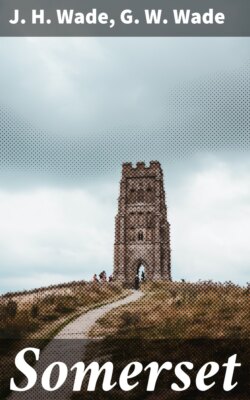Читать книгу Somerset - G. W. Wade - Страница 14
На сайте Литреса книга снята с продажи.
CELEBRITIES
ОглавлениеThe roll of Somerset worthies, either natives of or residents in the county, is long and illustrious. The Church, law, literature, philosophy, arms, science, politics, and adventure are all represented. The following alphabetic list contains the most important names, with dates and brief particulars.[5]
Natives
Alphege or Aelfeah, b. 954, at Weston near Bath; successively Bishop of Winchester and Archbishop of Canterbury; killed by the Danes, 1011; canonised.
Bacon, Roger, b. about 1214, at or near Ilchester; became a friar of the Franciscan Order; studied natural philosophy and wrote, besides other works, the "Opus Majus" (described as "at once the 'Encyclopaedia' and the 'Organon' of the 13th century"); d. 1294.
Bagehot, Walter, b. 1826, at Langport; economist and author of "The English Constitution"; d. 1877.
Beckington, Thomas, b. about 1390, at Beckington; successively Bishop of Salisbury and Bishop of Bath and Wells; d. 1465.
Blake, Robert, b. 1599, at Bridgwater; took part in the Great Civil War on the Parliamentary side, and defended Lyme and Taunton; made admiral of the fleet, and fought against Holland and Spain; d. 1657.
Coleridge, Hartley, b. 1796, at Clevedon; poet and biographical writer; d. 1849.
Coryate, Thomas, b. 1577, at Odcombe; travelled, first on the Continent (his journal, entitled "Coryat's Crudities," was long the only handbook for Continental travel), and subsequently in the East; d. at Surat, 1617.
Cudivorth, Ralph, b. 1617, at Aller; Professor of Hebrew and Master of Christ's College, Cambridge; author of "The True Intellectual System of the Universe"; one of the "Cambridge Platonists"; d. 1688.
Dampier, William, b. 1652, at East Coker; explorer and scientific observer; author of "A Discourse on the Winds" (said to have value even now as a text-book); d. 1715.
Daniell, Samuel, b. 1562, probably near Taunton; poet and prose writer (there appears to be no authority for the belief that he succeeded Spenser as poet-laureate); d. 1619.
Dunstan, b. 924, at Glastonbury; successively Abbot of Glastonbury, Bishop of Worcester and London, and Archbishop of Canterbury; d. 988; canonised.
Fielding, Henry, b. 1707, at Sharpham, near Glastonbury; novelist (best known work, "Tom Jones"); d. 1754 at Lisbon.
Hood, Samuel, b. 1724, at Butleigh; admiral (Nelson wrote of him as "the best officer, take him altogether, that England has to boast of"); made a viscount; d. 1816.
Hooper, John, b. 1495 (place unknown); Bishop of Gloucester and Worcester; burnt at the stake, 1555.
Irving, Henry (real name John Henry Brodribb); b. 1838, at Keinton-Mandeville; actor; knighted; d. 1905.
Kinglake, Alexander William, b. 1809, at Taunton; wrote "Eothen" and "Invasion of the Crimea"; d. 1891.
Locke, John, b. 1632, at Wrington; philosopher; author of "Essay on the Human Understanding," and works on education and the currency; d. 1704.
Norris, Edwin, b. 1795, at Taunton; Oriental scholar; d. 1872.
Parry, William Edward, b. 1790, at Bath; Arctic explorer; knighted; d. 1855.
Prynne, William, b. 1600, at Swainswick; Presbyterian pamphleteer; wrote "Histriomastix" (directed against stage-plays); several times pilloried; d. 1669.
Pym, John, b. 1584, at Brymore, near Cannington; politician; one of the five members of the Commons whom Charles I. sought to arrest; d. 1643.
Quekett, John Thomas, b. 1815, at Langport; microscopist and histologist; conservator of the Hunterian Museum; d. 1861.
Speke, John Hanning, b. 1827, at Ashill; African explorer; discovered Lakes Tanganyika and Victoria Nyanza; accidentally shot, 1864.
Young, Thomas, b. 1773, at Milverton; scientist, and Egyptologist; described as the founder of physiological optics, and one of the first to interpret the hieroglyphics on the Rosetta Stone; d. 1829.
Residents
Church, Richard William, Rector of Whatley from 1852 to 1871.
Coleridge, Samuel Taylor, resided at Clevedon (1795) and Nether Stowey (1796–98).
Ken, Thomas, Bishop of Bath and Wells from 1684 to 1691; wrote the morning and evening hymns, "Awake, my soul, and with the sun," and "Glory to Thee, my God, this night."
More, Hannah, resided for many years between 1786 and 1833 at Barley Wood, near Wrington, and did much to spread education and religion among the Mendip miners.
Smith, Sydney, the humorous Canon of St. Paul's, and one of the founders of the Edinburgh Review, held from 1829 till his death in 1845 the living of Combe Florey.
Wolsey, Thomas, the famous cardinal, held for a time the living of Limington. Whilst here he is said to have been put in the stocks by Sir Amyas Poulett of Hinton St. George for drinking too much cider. When he became Chancellor of England he revenged himself on the knight, who was Treasurer of the Middle Temple, by forbidding him to quit London without his leave.
Wordsworth, William, resided in 1797 at Alfoxden, a house near Holford.
For distinguished persons who have resided at Bath, see p. 46.
